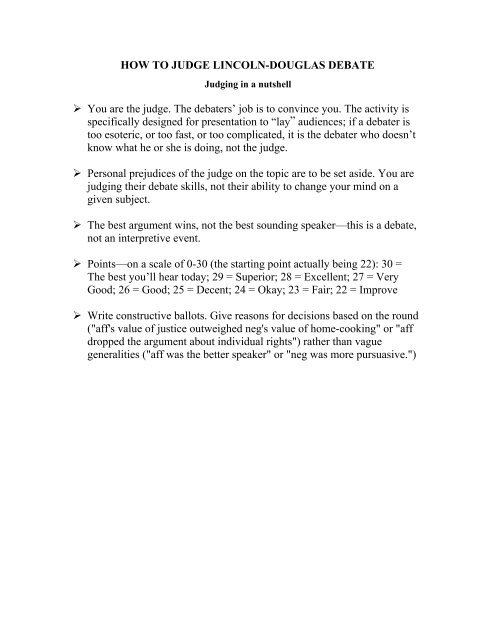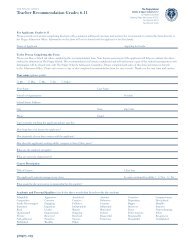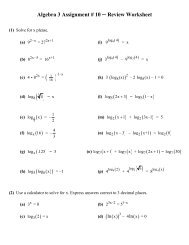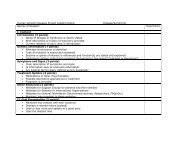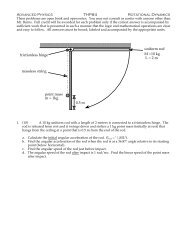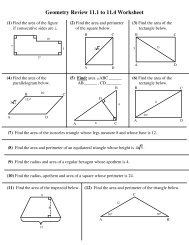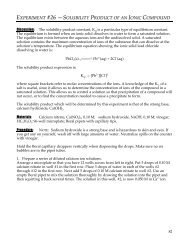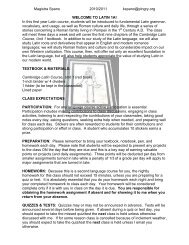HOW TO JUDGE LINCOLN-DOUGLAS DEBATE You are the judge ...
HOW TO JUDGE LINCOLN-DOUGLAS DEBATE You are the judge ...
HOW TO JUDGE LINCOLN-DOUGLAS DEBATE You are the judge ...
You also want an ePaper? Increase the reach of your titles
YUMPU automatically turns print PDFs into web optimized ePapers that Google loves.
<strong>HOW</strong> <strong>TO</strong> <strong>JUDGE</strong> <strong>LINCOLN</strong>-<strong>DOUGLAS</strong> <strong>DEBATE</strong><br />
Judging in a nutshell<br />
<strong>You</strong> <strong>are</strong> <strong>the</strong> <strong>judge</strong>. The debaters’ job is to convince you. The activity is<br />
specifically designed for presentation to “lay” audiences; if a debater is<br />
too esoteric, or too fast, or too complicated, it is <strong>the</strong> debater who doesn’t<br />
know what he or she is doing, not <strong>the</strong> <strong>judge</strong>.<br />
Personal prejudices of <strong>the</strong> <strong>judge</strong> on <strong>the</strong> topic <strong>are</strong> to be set aside. <strong>You</strong> <strong>are</strong><br />
judging <strong>the</strong>ir debate skills, not <strong>the</strong>ir ability to change your mind on a<br />
given subject.<br />
The best argument wins, not <strong>the</strong> best sounding speaker—this is a debate,<br />
not an interpretive event.<br />
Points—on a scale of 0-30 (<strong>the</strong> starting point actually being 22): 30 =<br />
The best you’ll hear today; 29 = Superior; 28 = Excellent; 27 = Very<br />
Good; 26 = Good; 25 = Decent; 24 = Okay; 23 = Fair; 22 = Improve<br />
Write constructive ballots. Give reasons for decisions based on <strong>the</strong> round<br />
("aff's value of justice outweighed neg's value of home-cooking" or "aff<br />
dropped <strong>the</strong> argument about individual rights") ra<strong>the</strong>r than vague<br />
generalities ("aff was <strong>the</strong> better speaker" or "neg was more pursuasive.")
2<br />
<strong>HOW</strong> <strong>TO</strong> <strong>JUDGE</strong> <strong>LINCOLN</strong>-<strong>DOUGLAS</strong> <strong>DEBATE</strong><br />
Judging out of a nutshell<br />
Since we often need to enlist p<strong>are</strong>nts and friends as LD <strong>judge</strong>s, we've put toge<strong>the</strong>r this<br />
guide to explain what LD is all about. It is not that hard to <strong>judge</strong>, and it's not that unusual<br />
for people to do it without a lot of prior experience. In fact, it is often p<strong>are</strong>nts from o<strong>the</strong>r<br />
schools who <strong>are</strong> judging our kids—that’s <strong>the</strong> way <strong>the</strong> activity works. In this guide we'll<br />
explain LD, discuss <strong>the</strong> mechanics of a round, explain what to do as a <strong>judge</strong>, how to pick<br />
a winner, and how to prep<strong>are</strong> a ballot. It is a lot to absorb at once, but it will get you<br />
started. The “in a nutshell” page will get you started and remind you of <strong>the</strong> key points.<br />
Dip into <strong>the</strong> later more detailed material when you’re more ready for it.<br />
And this is <strong>the</strong> most important message for a beginning p<strong>are</strong>nt <strong>judge</strong>: Start now! If<br />
you begin judging a few times a year when your kid is a novice, you’ll <strong>judge</strong> mostly<br />
young, inexperienced debaters. They know less about what <strong>the</strong>y’re doing than you do.<br />
They won’t talk fast or use any jargon, <strong>the</strong>y won’t try to confuse you, and you won’t have<br />
much difficulty feeling confident about your decisions. As time goes by, <strong>the</strong> kids will get<br />
better and you’ll get better along with <strong>the</strong>m, and before long you’ll feel confident judging<br />
just about anybody (and you will <strong>judge</strong> just about anybody). If you really believe that<br />
<strong>the</strong>re is value in your child’s commitment to forensics, you have to be able to support it.<br />
And you support it by becoming a good, dependable p<strong>are</strong>nt <strong>judge</strong>. Without good,<br />
dependable p<strong>are</strong>nt <strong>judge</strong>s, we simply cannot attend tournaments.<br />
What is LD<br />
Lincoln-Douglas is a one-on-one debate between two people affirming and negating a<br />
resolution. The resolutions change roughly every two months, and <strong>the</strong> topics <strong>are</strong> along<br />
<strong>the</strong> lines of, Which is Better, Anarchy or Tyranny or, Is Multi-culturalism Good or Bad<br />
or, Is <strong>the</strong> Death Penalty Just What <strong>the</strong> topics usually boil down to is a conflict between<br />
<strong>the</strong> rights of one individual or group of individuals measured against <strong>the</strong> rights of some<br />
o<strong>the</strong>r individual or group, or, is a certain action right or wrong (i.e., moral). What <strong>the</strong><br />
debaters offer in <strong>the</strong>ir cases is <strong>the</strong> greatest inherent value of ei<strong>the</strong>r <strong>the</strong> affirmative or<br />
negative; <strong>the</strong>y defend that value on <strong>the</strong>ir side, while attacking <strong>the</strong>ir opponent's value.<br />
(<strong>You</strong>’ll hear a lot about values in <strong>the</strong> LD world, and it’s good to understand early on what<br />
is meant by it. A value is an underlying goal, <strong>the</strong> reason one good action is preferable to<br />
ano<strong>the</strong>r good action. We’ll cover more of this later.) And <strong>the</strong> thing is, <strong>the</strong>re's no<br />
objectively right answer to <strong>the</strong> question posed by a resolution, which makes <strong>the</strong> topics<br />
eminently arguable.<br />
In any tournament, <strong>the</strong> debaters <strong>are</strong> required to argue both sides of <strong>the</strong> resolution;<br />
<strong>the</strong> point is to be persuasive on ei<strong>the</strong>r side, by acquiring and demonstrating <strong>the</strong> skills of<br />
reasoned argument. LD was specifically designed for lay audiences, as a response to <strong>the</strong><br />
more technical and hard-to-follow Policy style of debate. The style of presentation and<br />
content is specifically defined as being analogous to a presentation in a community<br />
meeting; <strong>the</strong>re should be nothing about it beyond <strong>the</strong> abilities of any student, or any<br />
<strong>judge</strong>.
3<br />
What to do as a <strong>judge</strong><br />
There <strong>are</strong> three kinds of <strong>judge</strong>s: coaches, p<strong>are</strong>nts/friends like you, and former debaters.<br />
The coaches and former debaters <strong>are</strong> experienced, and <strong>the</strong>y'll probably be judging <strong>the</strong><br />
toughest varsity rounds of <strong>the</strong> day, which gets you off <strong>the</strong> hook. But LD also draws a lot<br />
of less experienced <strong>judge</strong>s precisely because not that much experience is necessary, and<br />
<strong>the</strong>re <strong>are</strong> never enough coaches and former debaters. And this is a good thing, because if<br />
only <strong>the</strong> pros <strong>judge</strong>d <strong>the</strong> activity, eventually only <strong>the</strong> pros would understand it. Any<br />
sentient adult who knows how to listen and who's willing to suspend his or her own<br />
prejudices for a half an hour can <strong>judge</strong> LD. And <strong>judge</strong> it well.<br />
What follows here is an overview. We’ll come back to <strong>the</strong>se points one at a time<br />
later, so don’t worry if it starts sounding a little overwhelming.<br />
Prior to a round, schematics will be distributed, listing <strong>the</strong> names of <strong>the</strong> debaters,<br />
who's judging <strong>the</strong>m, and where. It will be very clear when this is happening, because<br />
<strong>the</strong>re will be an announcement and everyone in <strong>the</strong> room will flock to <strong>the</strong> distributor.<br />
Flock along with <strong>the</strong>m. Most LD rounds consist of two flights, an A flight and a B flight,<br />
which simply means that each round is actually two rounds cleverly disguised as one, but<br />
at least <strong>the</strong>y're usually both in <strong>the</strong> same room. After consulting <strong>the</strong> schematic and finding<br />
your name, go to <strong>the</strong> ballot table, check in and pick up your ballots. Then go to <strong>the</strong><br />
correct room, where as <strong>judge</strong> you should take <strong>the</strong> most comfortable seat available,<br />
excluding <strong>the</strong> overstuffed La-Z-Boy at <strong>the</strong> teacher's desk—teachers <strong>are</strong> more territorial<br />
than grizzly bears, and any hint of disturbance at a teacher's desk can set <strong>the</strong> National<br />
Forensic League back a hundred years. The debaters when <strong>the</strong>y arrive will logically take<br />
places where you can get a good look at <strong>the</strong>m. Then everyone does a little bookkeeping.<br />
The debaters pre-flow, i.e., get organized (which will always make you wonder why <strong>the</strong>y<br />
waited until <strong>the</strong> last minute, especially if it's B flight and <strong>the</strong>y've been camped outside<br />
your door for <strong>the</strong> last forty-five minutes). What <strong>the</strong> <strong>judge</strong> should do is prep<strong>are</strong> a pad to<br />
flow <strong>the</strong> coming argument. Flow The thing is, you've got to take notes if you really want<br />
to track what's going on, and what's going on in debate parlance is "<strong>the</strong> flow"—<strong>the</strong> flow<br />
of <strong>the</strong> arguments, <strong>the</strong> flow of <strong>the</strong> debate. We'll explain how to do a flow by showing it to<br />
you ra<strong>the</strong>r than writing it up here; it's mostly just taking notes on a legal pad in such a<br />
way that you can comp<strong>are</strong> <strong>the</strong> contentions with <strong>the</strong> refutations.<br />
When <strong>the</strong> debate begins, <strong>the</strong> <strong>judge</strong> has to time it. For beginning <strong>judge</strong>s, this is<br />
usually <strong>the</strong> hardest thing to do because it distracts you from listening to <strong>the</strong> proceedings.<br />
It is best to bring a big kitchen timer along with you, to make life easier (but trust us,<br />
eventually timing becomes second nature). The timings <strong>are</strong> usually listed on <strong>the</strong> ballot<br />
(and <strong>the</strong>y’re explained later in this manual). <strong>You</strong>r job is to signal <strong>the</strong> debaters how much<br />
time <strong>the</strong>y have used, as <strong>the</strong>y <strong>are</strong> using it; this is done by a simple countdown. After <strong>the</strong><br />
first minute has elapsed, raise your hand with <strong>the</strong> correct number of fingers showing <strong>the</strong><br />
time remaining. is five, going down to as one. Then a big C to show thirty<br />
seconds, a flat hand like a shadow duck to show fifteen seconds, countdown <strong>the</strong> last five<br />
seconds with your fingers one at a time to a closed fist that means time up. They can<br />
complete <strong>the</strong> sentence <strong>the</strong>y're in <strong>the</strong> middle of, but that's it. (If you <strong>are</strong> judging
4<br />
experienced varsity debaters, and both of <strong>the</strong>m have <strong>the</strong>ir own timers, which often<br />
happens, you might not have to give <strong>the</strong>m signals. Ask <strong>the</strong>m if <strong>the</strong>y need <strong>the</strong>m. If not,<br />
just set your timer along with <strong>the</strong>m to keep <strong>the</strong>m honest, and forget about it until <strong>the</strong> bells<br />
go off.)<br />
During <strong>the</strong> prep time—<strong>the</strong> gaps between <strong>the</strong> speeches when <strong>the</strong> debaters work on<br />
<strong>the</strong>ir arguments, adjusting to what <strong>the</strong> o<strong>the</strong>r debater has said—<strong>the</strong> <strong>judge</strong> will usually call<br />
out <strong>the</strong> elapsed time in thirty second intervals. Each debater usually takes prep time<br />
twice; <strong>the</strong> first time it makes sense to tell <strong>the</strong>m—and you will call this out verbally—"30<br />
seconds used," "Minute used," "Minute and a half used." Their second prep, it's probably<br />
better to count down. "Minute remaining," "Thirty seconds remaining," "Time."<br />
Aside from timing, <strong>the</strong> <strong>judge</strong> is under no obligation to utter a word during <strong>the</strong><br />
round. And when it’s over, <strong>the</strong>re is no rule that you must disclose your decision to <strong>the</strong><br />
debaters, and <strong>the</strong>y usually don't expect a verbal critique. The exception to this is <strong>the</strong> Mid-<br />
Hudson League (MHL) debates, which <strong>are</strong> learning debates for novices and junior<br />
varsity, so verbal critiques <strong>are</strong> actually encouraged, but if you're not comfortable giving<br />
one, you don't have to. Whatever you do, don't get involved in yet ano<strong>the</strong>r debate! The<br />
<strong>judge</strong>'s word is law. Make sure you don't end up starting up <strong>the</strong> argument again.<br />
As soon as <strong>the</strong> debate is over, <strong>the</strong> kids will leave <strong>the</strong> room. Write up your ballot<br />
now, while it's still fresh in your mind. If <strong>the</strong> B flight comes into <strong>the</strong> room while you're<br />
writing up <strong>the</strong> A flight—and <strong>the</strong>y will—tell <strong>the</strong>m to cool <strong>the</strong>ir heels for two minutes. If B<br />
flight is over and people <strong>are</strong> trying to start a whole new round, leave <strong>the</strong> room yourself<br />
and find a quiet corner to write up your ballot. Occasionally a tournament will be running<br />
behind time and <strong>the</strong>y'll ask you to "white sheet" a round—that is, give <strong>the</strong>m <strong>the</strong> top white<br />
sheet of <strong>the</strong> ballot filled in with only <strong>the</strong> names of <strong>the</strong> winner and loser and <strong>the</strong> points<br />
awarded, after which you can write up your commentary immediately <strong>the</strong>reafter and<br />
submit it separately. In ei<strong>the</strong>r case, ballots <strong>are</strong> returned to <strong>the</strong> ballot table where <strong>the</strong>y'll<br />
check that all <strong>the</strong> information is accurate, and set you free for a much needed doughnut in<br />
<strong>the</strong> <strong>judge</strong>s' lounge.<br />
The mechanics of LD<br />
The debate is a series of speeches on both sides. In order <strong>the</strong>y <strong>are</strong>:<br />
1) The affirmative constructive (AC—6 minutes). First up is <strong>the</strong> affirmative side, for<br />
a six minute speech. Usually <strong>the</strong> aff will begin with a quotation, <strong>the</strong>n perhaps some<br />
definitions of key terms in <strong>the</strong> resolution, and perhaps an observation or two setting<br />
some boundaries to <strong>the</strong> discussion. The aff will <strong>the</strong>n usually decl<strong>are</strong> <strong>the</strong> value that he<br />
or she is going to defend, and perhaps a criterion through which to measure that value<br />
(we’ll explain that later). Then <strong>the</strong> aff will <strong>the</strong>n go into its contentions, which <strong>are</strong> <strong>the</strong><br />
meat of <strong>the</strong> argument: <strong>the</strong>se <strong>are</strong> usually two or three <strong>are</strong>as of analysis explaining <strong>the</strong><br />
affirmative position in detail.<br />
2) Cross-examination by negative (CX—3 minutes). At <strong>the</strong> conclusion of <strong>the</strong> AC, <strong>the</strong><br />
negative debater will directly question <strong>the</strong> affirmative for three minutes. There <strong>are</strong> no<br />
boundaries on CX, short of abusing your opponent; any question can and will be
5<br />
asked. In CX, <strong>the</strong> best debaters both chisel away at <strong>the</strong> flaws in <strong>the</strong>ir opponent's case<br />
and set <strong>the</strong> framework for <strong>the</strong>ir own case.<br />
3) The negative constructive (NC—7 minutes). Next up (after a couple of minutes<br />
preparation time) is <strong>the</strong> neg to make <strong>the</strong> opposing argument. Again, we'll probably<br />
start with a quote, <strong>the</strong>n perhaps new definitions if for some reason neg feels that <strong>the</strong><br />
aff's definitions <strong>are</strong> inadequate or misleading, followed perhaps by more<br />
observations. Then <strong>the</strong>re's neg's value/criterion, which may be <strong>the</strong> same or different<br />
from aff's. Next neg presents two or three of its own contentions against <strong>the</strong><br />
resolution (contentions, by <strong>the</strong> way, <strong>are</strong> also sometimes refered to as lines of<br />
analysis). When <strong>the</strong> neg is finished its contentions, neg <strong>the</strong>n goes on to refute <strong>the</strong> aff<br />
case, point by point. In o<strong>the</strong>r words, now <strong>the</strong> debating really begins as neg attacks<br />
aff’s contentions.<br />
4) Cross-examination by <strong>the</strong> affirmative (CX—3 minutes). At <strong>the</strong> conclusion of <strong>the</strong><br />
NC, <strong>the</strong> aff debater will grill <strong>the</strong> negative, just like aff was grilled by negative before.<br />
Same no-rules apply.<br />
5) First affirmative rebuttal (1AR—4 minutes). From now on, it's all argument. Both<br />
sides have made <strong>the</strong>ir cases. Now <strong>the</strong>y defend <strong>the</strong>ir side and attack <strong>the</strong>ir opponent's.<br />
The first affirmative rebuttal is a four-minute speech by aff, and it's not much time to<br />
cover everything, but covering everything is <strong>the</strong> order of <strong>the</strong> day. Usually aff begins<br />
by going point by point refuting <strong>the</strong> neg case, <strong>the</strong>n defends against <strong>the</strong> neg's previous<br />
refutations of <strong>the</strong> aff case. It can get hectic, but it's one of <strong>the</strong> high points of <strong>the</strong><br />
debate.<br />
6) Negative rebuttal (NR—6 minutes). Neg is up again, to defend <strong>the</strong> neg case and<br />
once again refute <strong>the</strong> aff. But neg has six minutes, plenty of time to go into deep<br />
analysis of <strong>the</strong> issues. Usually neg will attempt to sum up or "crystallize" <strong>the</strong> round at<br />
<strong>the</strong> conclusion of <strong>the</strong> NR, urging you to deliver a negative ballot.<br />
7) The second affirmative rebuttal (2AR --3 minutes). To make up for <strong>the</strong> app<strong>are</strong>nt<br />
time imbalance, aff gets <strong>the</strong> last word in <strong>the</strong> 2AR. Aff usually uses <strong>the</strong> time to<br />
summarize <strong>the</strong> round, crystallizing <strong>the</strong> key voting points and, of course, urging an<br />
affirmative ballot.<br />
8) Note that both sides do have an allotment of preparation time, usually a total of four<br />
minutes, which <strong>the</strong>y will usually use prior to making <strong>the</strong>ir rebuttal speeches (although<br />
once in a blue moon a kid uses prep before a CX).<br />
9) Whew!<br />
What to look for in a debate round in order to pick a winner<br />
Choosing in favor of a debater is called picking up. Choosing against <strong>the</strong>m is called<br />
dropping. Regardless of your abilities as a <strong>judge</strong>, debaters you pick up will consider you<br />
an expert (provided your allotment of speaker points is commensurate with <strong>the</strong>ir normal<br />
expectations—we'll discuss speaker points later), while <strong>the</strong> debaters you drop will<br />
suspect that <strong>the</strong>ir pet ferret could have done a better job than you have. But that's to be<br />
expected.
6<br />
Obviously, <strong>the</strong> person who makes <strong>the</strong> best argument(s) wins. If <strong>the</strong> subject is one<br />
on which you have a personal opinion (for example, <strong>the</strong> death penalty), it is still <strong>the</strong><br />
person who makes <strong>the</strong> best argument in that round, and not what you happen to believe<br />
yourself. Personal prejudices of <strong>the</strong> <strong>judge</strong> must be set aside. <strong>You</strong> <strong>are</strong> here as a tabula rasa,<br />
to listen to what is said by <strong>the</strong> debaters, not to have a mindset of your own that needs to<br />
be changed. Just because you think that capital punishment is justified doesn’t mean that<br />
<strong>the</strong> debater who argued in favor of it automatically won <strong>the</strong> debate, or that <strong>the</strong> debater<br />
who argued against it automatically lost. If that were so, you wouldn’t have to listen to<br />
<strong>the</strong>m at all! Judge <strong>the</strong>ir debating in a vacuum, not in relation to your opinions. Of course,<br />
usually <strong>the</strong> resolutions <strong>are</strong> (intentionally) so broad that ei<strong>the</strong>r side could win, so you<br />
won't have to worry about your own prejudices.<br />
Crystallization points. Often debaters wind up by offering crystallization points, or<br />
voting issues, at <strong>the</strong> end of <strong>the</strong>ir last speeches. These <strong>are</strong> <strong>the</strong> aspects of <strong>the</strong>ir side of <strong>the</strong><br />
case that <strong>the</strong> debaters claim to have won. It is a good idea to use <strong>the</strong>se voting issues as<br />
your own issues when making a decision, since <strong>the</strong>se <strong>are</strong> <strong>the</strong> points <strong>the</strong> debaters think <strong>are</strong><br />
<strong>the</strong> biggies, and <strong>the</strong>y’re usually right (although whe<strong>the</strong>r <strong>the</strong>y won those points or not is<br />
<strong>the</strong> question only you can answer). Newer debaters don’t often use crystallization points,<br />
but more experienced varsity debaters usually <strong>are</strong> adept at this part of <strong>the</strong> presentation,<br />
which is very helpful to any <strong>judge</strong>, no matter how experienced. Of course, you may not<br />
agree that <strong>the</strong> debater won a point that he or she claims he won, and you may rank <strong>the</strong><br />
importance of <strong>the</strong> issues differently than <strong>the</strong> debaters, but that’s precisely why you earn<br />
<strong>the</strong> big bucks. But <strong>the</strong> debaters <strong>are</strong> trained to help you “write <strong>the</strong> ballot.” Give <strong>the</strong>m a<br />
chance to do it.<br />
Values. Each debater should uphold his value. The value is <strong>the</strong> reason <strong>the</strong> actions chosen<br />
by a side <strong>are</strong> preferable to <strong>the</strong> actions chosen by <strong>the</strong> o<strong>the</strong>r side. Values <strong>are</strong> an extremely<br />
important concept in LD, and <strong>the</strong>y include such abstract ideas as justice, or freedom, or<br />
equality. Values <strong>are</strong> <strong>the</strong> underlying why for affirming or negating, <strong>the</strong> moral or ethical or<br />
philosophical or metaphysical or whatever you want to call it thrust of <strong>the</strong> debater’s case.<br />
Values can be different or <strong>the</strong> same for <strong>the</strong> two sides. If <strong>the</strong> value is justice for both sides,<br />
for instance, which case ultimately came across as <strong>the</strong> most just If <strong>the</strong> values <strong>are</strong><br />
different for <strong>the</strong> two sides, say justice for aff and individual rights for neg, you have to<br />
measure which value applies better to <strong>the</strong> resolution after you've heard <strong>the</strong>ir arguments.<br />
Which debater convinced you that he or she best supports his or her value If it’s equal,<br />
which proved to have <strong>the</strong> “higher”—more important—value<br />
Criteria. If a debater establishes a criterion for a case, you should use <strong>the</strong> criterion to<br />
measure <strong>the</strong> value. (This is as complicated as debating gets, by <strong>the</strong> way.) A good analogy<br />
to understand values and criteria is that, let's say you want to buy a car because you need<br />
transportation. Transportation is your value. What <strong>are</strong> <strong>the</strong> criteria you use to buy <strong>the</strong> car<br />
If you want speed and fashionability and fun, you might opt for a sports car, while if you<br />
want spaciousness and safety for a large family you might opt for a minivan. The end<br />
result is still a car, but it's a different kind of car, and your reasons—or criteria—for<br />
buying it <strong>are</strong> entirely different. Criteria in LD usually come into strongest play when <strong>the</strong><br />
values <strong>are</strong> <strong>the</strong> same for both sides. However, <strong>the</strong>re is no "rule" that a debater must have a
7<br />
criterion (despite what some debaters might say to you during <strong>the</strong> round). Not having a<br />
value to uphold, however, means that <strong>the</strong> debater misses <strong>the</strong> point of LD in <strong>the</strong> first place<br />
(which doesn't mean <strong>the</strong>y will, however. This is a marginally controversial <strong>are</strong>a of LD,<br />
but as a rule, Nor<strong>the</strong>astern debaters do clearly set out to uphold a value, with a criterion).<br />
Style. LD debate is not an event where <strong>the</strong> style of speech comes into play, so it is not <strong>the</strong><br />
best orator that wins but <strong>the</strong> best debater. <strong>You</strong> do not vote for <strong>the</strong> debater who sounds <strong>the</strong><br />
best; it is what <strong>the</strong>y say that is important. That’s why you have to listen c<strong>are</strong>fully and take<br />
notes. There has to be a clash, and someone has to win it. Essentially, each side defends<br />
two or three contentions of his or her own, and replies to <strong>the</strong> opponent’s two or three<br />
contentions. The best arguments <strong>are</strong> <strong>the</strong> ones that you found <strong>the</strong> most logically<br />
compelling. It’s as simple as that. Some arguments might sound entirely ridiculous to<br />
you. That means that, as far as <strong>the</strong> <strong>judge</strong> in this round is concerned, an argument is<br />
entirely ridiculous. YOU ARE THE <strong>JUDGE</strong>. Be open to what <strong>the</strong>y’re saying, but don’t<br />
turn off your brain, only your prejudices. <strong>You</strong> want to be an impartial evaluator of <strong>the</strong>ir<br />
debating. Who outdebated whom<br />
Interventionist vs non-interventionist <strong>judge</strong>s. An interventionist <strong>judge</strong> applies some<br />
of his or her own thinking on a topic, while a non-interventionist <strong>judge</strong> only evaluates<br />
what is said by <strong>the</strong> debaters. This is not as simple as it sounds. If a debater argues<br />
something that you know is wrong, but <strong>the</strong> opponent doesn’t know it, and concedes it,<br />
that means that <strong>the</strong> concession should stand, even though <strong>the</strong> concession is wrong. <strong>You</strong><br />
would not want to intervene and give <strong>the</strong> point to <strong>the</strong> opponent who misguidedly<br />
conceded it. Similarly, if you hear a contention and can think of a great argument against<br />
it, but <strong>the</strong> opponent instead comes up with a pretty lousy argument, you have to follow<br />
what was actually said ra<strong>the</strong>r than what should have been said. That is simple nonintervention,<br />
and this is what you should be trying to do. Judge only what is said, not<br />
what was implied or meant, or what you would have preferred to have heard.<br />
Drops. Intervention gets more complex, and controversial, with <strong>the</strong> issue of drops. As<br />
you go down <strong>the</strong> flow of a case, sometimes a debater will drop an issue; that is, <strong>the</strong> first<br />
debater contends that cows have wings, and <strong>the</strong> opposing debater never responds to it.<br />
That means that <strong>the</strong> second debater has dropped flying cows. If <strong>the</strong> original debater<br />
stands up in <strong>the</strong> next speech and points out <strong>the</strong> drop to <strong>the</strong> <strong>judge</strong>, I would suggest that this<br />
is a contention that must stand for <strong>the</strong> original debater; in o<strong>the</strong>r words, <strong>the</strong> debater who<br />
first made <strong>the</strong> statement wins that statement, no matter how cockamamie, if <strong>the</strong> opponent<br />
drops it. Having a point stand in this way is just as good as proving through<br />
argumentation that cows have wings. Anything <strong>the</strong> opponent subsequently says to this<br />
point in a later speech, after dropping it, is unacceptable. However, if <strong>the</strong> point is dropped<br />
and <strong>the</strong> original debater does not cite <strong>the</strong> drop, <strong>the</strong>n it just disappears as an issue from <strong>the</strong><br />
round. Nei<strong>the</strong>r debater can meaningfully bring up that subject again. If ei<strong>the</strong>r of <strong>the</strong>m do,<br />
all that discussion is wasted, because once a point has been dropped, it cannot be revived.<br />
I’m not saying a round should be won or lost on flying cows, but simply that this is how<br />
dropping points does work. Sometimes, especially with novice debaters, whole cases will<br />
be dropped left and right, and a debater will get a straightforward technical win as a<br />
result. <strong>You</strong> won't often see this at <strong>the</strong> varsity level. The interventionist issue can be very
8<br />
sticky here. Usually dropped points <strong>are</strong> good points, but what if <strong>the</strong> dropped point is<br />
indeed that cows have wings Use your judgment here. If <strong>the</strong> dropper made all good<br />
arguments and dropped some small stuff, go that way. If <strong>the</strong> round is close, and you need<br />
to evaluate on drops and extension, you just have to do it. I hate to think that a debater<br />
can win by responding to everything that is said, without having good arguments. Good<br />
arguments should win. That should be what debating is all about.<br />
One last thing about drops. The 1AR is that four-minute rebuttal by affirmative,<br />
where everything has to be covered in a short amount of time. This is <strong>the</strong> place where it<br />
may appear that an aff is dropping issues, but keep in mind <strong>the</strong> reality of <strong>the</strong> time<br />
pressure. No matter how fast <strong>the</strong> aff speaks, he can't have that much depth of analysis,<br />
and <strong>the</strong>re's going to be trade-offs in both directions. The aff should cover <strong>the</strong> main points<br />
of <strong>the</strong> contentions, but when <strong>the</strong> neg has 112 bitsy little subpoints all <strong>the</strong> aff has to do is<br />
address <strong>the</strong> meat, not every little detail.<br />
Ad hoc voting issues. One interesting thing that might occur during a cross-examination<br />
is that both debaters can make an agreement that whoever wins this or that specific point<br />
wins <strong>the</strong> round. This is perfectly acceptable in LD and completely clarifies your job as a<br />
<strong>judge</strong>. <strong>You</strong> will now give <strong>the</strong> round to whomever does best what <strong>the</strong> two debaters agreed<br />
had to be done.<br />
Summary. In <strong>the</strong> final analysis, you <strong>are</strong> <strong>the</strong> <strong>judge</strong> and what you say goes. Sometimes a<br />
round will be easy, when two opponents <strong>are</strong> mismatched and one clearly takes it from <strong>the</strong><br />
o<strong>the</strong>r. In closer rounds, one little dropped point may make <strong>the</strong> difference. And in <strong>the</strong> best<br />
rounds, with equal opponents, you will simply listen to what <strong>the</strong>y both have to say and<br />
award <strong>the</strong> win to <strong>the</strong> side that convinced you better that he or she was right. Because<br />
judging is complex and subjective no matter how you slice it, in elimination rounds <strong>the</strong>re<br />
<strong>are</strong> panels of multiple <strong>judge</strong>s, many of whom <strong>are</strong> extremely experenced and who totally<br />
disagree with each o<strong>the</strong>r. Don’t feel bad if you’re not sure of a decision. Many rounds <strong>are</strong><br />
something of a toss-up, and good debaters will always eventually out in <strong>the</strong> end. If <strong>the</strong><br />
best <strong>judge</strong>s can disagree among <strong>the</strong>mselves, how objective can this stuff be<br />
How to prep<strong>are</strong> a ballot<br />
There <strong>are</strong> two parts to <strong>the</strong> ballot. There's picking <strong>the</strong> winner and loser and assigning <strong>the</strong>m<br />
speaker points, and <strong>the</strong>re's writing up <strong>the</strong> reasons for your decisions (often abbreviated<br />
RFD).<br />
Speaker points usually range from 20 to 30, and <strong>are</strong> used by <strong>the</strong> tabulators to<br />
balance and seed rounds and to award trophies. In LD, ties <strong>are</strong> acceptable at some<br />
tournaments, so if you wish to tie <strong>the</strong> opponents, you might be able to do so. Check at <strong>the</strong><br />
ballot table. And when awarding points, remember, points <strong>are</strong> for <strong>the</strong> best debating, not<br />
<strong>the</strong> greater oratorical skill. Rules of thumb: 20-21 is too stingy, so don't; 22 is pretty<br />
much a disaster, a kid who drops a whole case, whose contentions didn't make any sense,<br />
that sort of thing; 23-24 is when <strong>the</strong>y seemed to have <strong>the</strong> basics down but just didn't<br />
debate that well, <strong>the</strong>y hemmed and hawed a lot where <strong>the</strong>y should have been refuting,<br />
<strong>the</strong>y repeated <strong>the</strong>mselves over and over ra<strong>the</strong>r than adding new levels of analysis; 25-26
9<br />
<strong>are</strong> pretty good but <strong>the</strong>y didn't wow you, <strong>the</strong>y dropped a bunch of stuff, <strong>the</strong>y just weren’t<br />
solid; 27-29 <strong>are</strong> from really good to really really good to really really really excellent;<br />
and 30s <strong>are</strong> occasionally awarded, not because perfection has been reached, but because<br />
you feel this is about as close to as good as it gets. If you happen to <strong>judge</strong> an elimination<br />
round, speaker points <strong>are</strong> not necessary, as only <strong>the</strong> issue of winning or losing is<br />
important now. If you're worried about speaker points, it is better to err on <strong>the</strong> side of<br />
generosity. Giving a couple of extra points to a lesser debater won't hurt anybody, and<br />
will make <strong>the</strong> lesser debater feel good. Giving undeservedly low points to a solid debater,<br />
however, may be enough of a difference for <strong>the</strong>m that day to lose a trophy. Try to be<br />
reasonable on a 2-10 scale, but if you're unsure, especially when you're new to this, err<br />
higher ra<strong>the</strong>r than lower. (The Whitman college scale should be helpful: 30 = Amazing;<br />
29 = Superb; 28 = Excellent; 27 = Very Good; 26 = Good; 25 = Decent; 24 = Okay; 23 =<br />
Fair; 22 = Improve. Ano<strong>the</strong>r aid for point assignment is to comp<strong>are</strong> points to grades. 22-<br />
23 is a D, 25-25 is a C, 26-27 is a B, 28-30 is an A.)<br />
Writing up <strong>the</strong> reasons for decision on your ballot is not an easy business. There<br />
<strong>are</strong> as many different styles of ballots as <strong>the</strong>re <strong>are</strong> <strong>judge</strong>s. Whatever you want to say is<br />
fine, but certainly more is better than less. In <strong>the</strong> case of newer debaters, anything you<br />
say to both of <strong>the</strong>m will help <strong>the</strong>m improve in <strong>the</strong> future. But be constructive: <strong>the</strong>se <strong>are</strong><br />
kids, after all: you want to give <strong>the</strong>m tips for improvement, not traumas that will<br />
eventually turn <strong>the</strong>m into serial killers. In <strong>the</strong> case of more experienced debaters, your<br />
decision will probably be pretty complicated and boil down to one or two debating issues<br />
from <strong>the</strong> round. Here you might try to recapitulate what you heard and <strong>the</strong> way you heard<br />
it, comp<strong>are</strong> <strong>the</strong> arguments, and say what it worked or didn't work because of whatever.<br />
It's up to you. The biggest thing to keep in mind is that <strong>the</strong>se ballots <strong>are</strong> torn into after a<br />
debate like <strong>the</strong>y're <strong>the</strong> Dead Sea scrolls. Be fair, clear and constructive.


